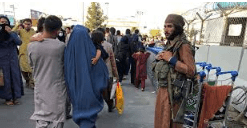With the Taliban’s taking the throne in August 2021, many Afghans feared facing the repression that characterized the violent rule by the militant groups in the 1990s. After seizing power, they tried to bribe the local people and international communities by projecting themselves as a more moderate force and pledging to uphold human rights and press freedom.
But after taking over the nation and toppling the Western-backed Afghan government two years ago, they have fallen short of their promises and instead have severely restricted the rights of women, carried out a savage crackdown on dissent, and reinstated their ruthless system of justice.
The Taliban’s theocratic government has imposed restrictions on every aspect of life in Afghanistan, including people’s appearances, freedom of movement, right to work or study, and access to entertainment.
The strict rules have disproportionately affected women, and rights organizations have accused the Taliban of seeking to arrest and eliminate women from public life.
The Taliban has issued over 100 verdicts and orders in line with its extreme and tribal interpretation of Islamic Shari’a law.
Lets have a look at the timeline of these verdicts and restrictive orders
- August 2021- Just days after seizing power, the Taliban instructs women to stay at home and avoid travel.
- September 2021- Taliban issued an order banning the shaving of beards.
- December 2021- Retail shops were ordered to remove the heads of mannequins.
- March 2022- Foreign TV series were banned. Norouz, the pre-Islamic Persian New Year, was cancelled.
- April 2022- Taliban banned TikTok and the popular online game PUBG.
- May 2022- Women-owned and women-run restaurants in Herat Province were closed. All women were ordered to cover their faces in public by wearing an all-encompassing burqa or niqab
- December 2022- Girls above the sixth grade were banned from school.
- January 2023- Pharmacies are ordered not to sell several medicines.
- February 2023- Female medical staff in Kabul are ordered to wear hijab and face masks at all times.
- April 2023- Due to a Taliban ban, video games and musical instruments can no longer be bought in Herat Province.
- May 2023- Taxi drivers were ordered to change the color of their vehicles from yellow to turquoise.
- July 2023- Taliban banned women’s beauty salons. All teacher-training centers were ordered to close
Taliban morality standards, such as its stringent dress code and gender segregation in society, are enforced by the Ministry for the Promotion of Virtue and the Prevention of Vice.
Many of the Taliban’s orders and restrictions are reminiscent of the group’s first stint in power from 1996-2001, when its brutal regime deprived Afghans of their most basic rights.
Since regaining power, the Taliban has scrapped Afghanistan’s constitution and criminal code and overhauled the justice system. With many of the Taliban’s laws not codified, enforcement of them has been uneven across the country. Local Taliban leaders have often issued their own edicts and restrictions.
Afghans fear the Taliban will impose more draconian edicts as it establishes what it has called a “pure” Islamic system in Afghanistan. The militants are likely to further erode women’s rights. The militant group is also likely to expand its crackdown on the media. The few independent media outlets that still operate in Afghanistan face severe restrictions on what they can report.
With media outlets facing more censorship as well as more cases of journalists being detained and threatened, the country’s once vibrant media scene is likely to shrink further.


